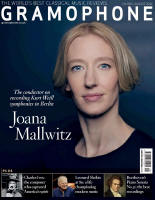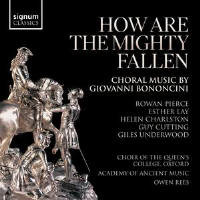Texte paru dans: / Appeared in:
|
|
|
|
|
|
A few of Bononcini’s sacred works copied in English 18th-century manuscripts can be connected to their use in concerts by the Academy of Ancient Music, a society of practitioners and connoisseurs founded in 1726 that met for weekly meetings at the Crown and Anchor pub on the Strand (this organisation inspired Christopher Hogwood to adopt its name for his period-instrument orchestra). All four pieces receive top-notch premiere recordings with the Choir of The Queen’s College, Oxford, and the players of the present-day AAM; a 1992 Dutch recording of the anthem When Saul was king is so obscure that it hardly counts.
Ave maris stella moves through a quick succession of contrasting verses unified by a walking bass line and unfurling violins. In contrast, a flamboyant Te Deum is replete with timpani, trumpets and oboes (the latter uncredited in the booklet). Concise choruses are sung with a sure sense of harmonic shaping and immaculate diction, although Bononcini’s setting concentrates primarily on movements designed for soloists: Giles Underwood and Guy Cutting share expressive fluidity (‘Tu ad liberandum’), Helen Charlston contributes cantabile plangency (‘Dignare Domine’), and Rowan Pierce displays crystalline precision and graceful agility (‘Fiat misericordia’, which has rolling interjections from oboes alternating with violins). Laudate pueri has more than a tinge of Roman concertato sacred music at the start of the 18th century – such as the bass aria ‘A solis ortu’ (its solo cello part played elegantly by Sarah
MacMahon), the proclamatory five-part chorus ‘Quis sicut Dominus’ and a compelling climax to the animated choral fugue ‘Ut collocet eum cum principibus’. When Saul was king was commissioned for the funeral of the first Duke of Marlborough at Westminster Abbey in 1722. More than 70 musicians participated in the ceremony mourning the victor of Blenheim; Rees’s smaller-scale chamber choir (36 singers) and an orchestra of about 14 players likely reflects the anthem’s occasional later revivals in the Academy of Ancient Music’s concerts. The solemn opening lines flow into a vigorous fugue that pays blatant tribute to the deceased military hero (ie a captain pursues the nation’s enemy with a sword). A spirited rendition of the duet ‘How are the mighty fallen’ misses potential for gentler introspection, although the lament ‘All the night she weepeth sore’ is a doleful dialogue between Charlston’s melancholy and violinist Bojan Cicic’s poeticism.
|
|




